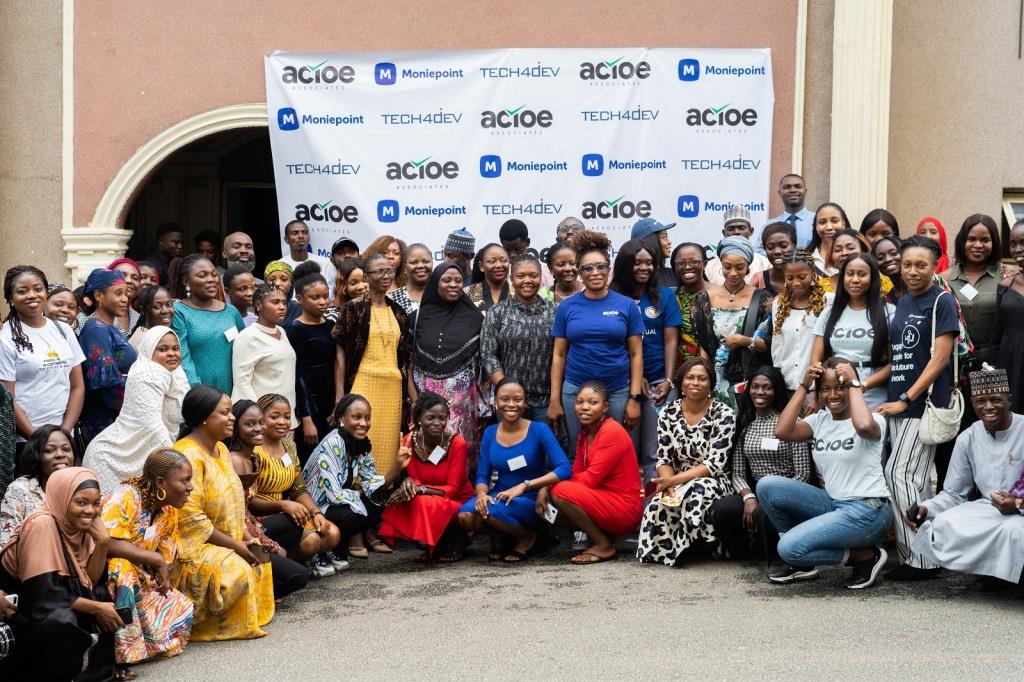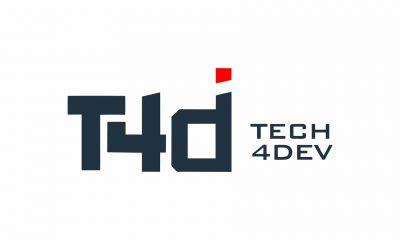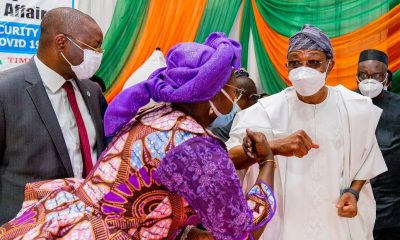Economy
Tech4Dev, Microsoft to Empower 10,000 Women

By Adedapo Adesanya
To mark this year’s International Women’s Day, Tech4Dev has partnered with Microsoft to launch its Women Techsters Initiative to empower 10,000 women in tech from Nigeria and four other African countries.
The initiative is aimed at bridging the vast digital divide between men and women in the technology ecosystem and to change the narrative of skewed gender numbers in technology by empowering women with digital and deep tech skills and opportunities to pursue careers and interests in technology.
According to the e-Conomy Africa 2020 Report by IFC, Africa’s technology industry has an average of 8:2 men to women ratio. These numbers reflect urban cities, and the statistics for women further reduce in suburban and rural areas across the continent.
Hence, there is a large need for gender parity and inclusivity in the technology space with numbers showing that having women effectively engaged in the labour force can potentially boost a nation’s annual GDP by as much as 70 per cent.
As a foundation, having more women in tech was the backbone behind the Women Techster’s pilot program.
The Nigerian Women Techsters, held in partnership with Microsoft, GIZ and other partners, enabled over 2400 women between the ages of 16-40 across 12 states in Nigeria to pursue careers in tech, start technology or tech-enabled businesses and to study STEM at an advanced level.
During the event, Tech4Dev launched the Women Techsters initiative, a renewed vision and dream to empower 5 million women with digital and deep tech skills across Africa by 2030.
This year alone, the initiative will impact 10,000 women across 5 African countries – Nigeria, Egypt, South Africa, Kenya and Ghana.
Speaking at the launch, in her opening address, the Regional Director for Middle East and Africa, Microsoft Philanthropies, Mrs Ghada Khalifa, stressed the importance of empowering women with digital skills to become active players in ICT and how this inclusion can have a direct impact on the economy.
She said, “When we empower girls and women in the ICT industry through greater access to skills and training, we unlock not only innovation but also economic opportunities.”
On her part, Mrs Diwura Oladepo, the Executive Director of Tech4Dev, spoke about the objective behind the Women Techsters initiative. She noted that it will provide the prerequisite knowledge and insight needed to enable girls and women interested in careers in technology to access the right learning opportunities, gain access to decent jobs within the technology ecosystem and to empower them with the right skills needed to create, grow and scale their technology-enabled businesses and deep tech startups.
In her words, “it is crucial to ensure that women are actively engaged in technology as this helps to financially empower them, effectively improve the economic realities of women and the countries at large, eliminate biases in technology research and improve overall productivity and efficiency of the technology ecosystem.
“Through the Women Techsters, we choose to challenge the status quo – that women can’t be active contributors and partakers in technology.”
In a panel session moderated by Akin Banuso, the Microsoft Country Manager for Nigeria, with the panellists; Mirna Arif, Lilian Barnard and Kendi Ntwiga-Nderitu (Country Managers for Egypt, South Africa and Kenya, respectively) explored the inclusivity of women in the tech industry and STEM fields as a whole.
Speaking on the gender disparity in the tech ecosystem, Ms Lilian Barnard, Microsoft Country Manager, South Africa, reiterated that people only dream as far as their eyes can see.
“Women don’t have access to programs that would equip them with digital skills relevant to the tech world. We are glad that organisations like Tech4Dev are taking it upon themselves to hold programs, seminars and events that enlighten, educate and inspire women to take up tech careers.”
As for Mrs Kendi Ntwiga-Nderitu, Microsoft Country Manager, South Africa, she encouraged women to push for a better future.
She said, “Traditionally, women have been and are known to be naturalists in society, whether it is in bringing communities together or playing roles to foster growth.
“For women to keep on playing these roles in the 21st century, a world that is tech-inclined, means we have a very significant role to play in the growth and development of our society.”
In the same vein, Ms Mirna Arif, Microsoft Country Manager, Egypt, encouraged women to ensure that they put in place plans to grow, challenge the status quo and speak up to pave the way for other women to have seats at the table.
Economy
Nigeria to Export New Crude Grade Cawthorne in March

By Adedapo Adesanya
The Nigerian National Petroleum Company (NNPC) Limited is set to commence export of a new light, sweet crude grade known as Cawthorne from March 2026.
According to a report by Reuters, an NNPC spokesperson confirmed the development, describing it as part of efforts to increase output and consolidate Nigeria’s recent recovery in crude oil production.
The move aligns with Nigeria’s broader strategy to boost production after years of constraints caused by pipeline vandalism, crude theft, and unrest in oil-producing regions.
This follows the launch of two other new grades, Obodo in 2025 and Utapate in 2024, Nigeria, whic,h as Africa’s top oil exporter, seeks to strengthen its standing within the Organisation of the Petroleum Exporting Countries and its allies (OPEC+)
Cawthorne crude is scheduled for export in the third week of March and has an API gravity of 36.4, making it similar in quality to Nigeria’s Bonny Light, which is prized for high petrol and diesel yields.
According to Reuters, citing a trading source, the state oil national company issued a tender last week for cargo loading between March 24 and 25.
Analysts at Kpler noted that the new grade is expected to be exported via the Floating Storage and Offloading (FSO) vessel Cawthorne, which has a storage capacity of about 2.2 million barrels. The vessel is designed to enhance transportation and production from Oil Mining Lease (OML) 18 and nearby assets in the Eastern Niger Delta.
Kpler estimates that, based on storage capacity, Cawthorne could increase Nigeria’s crude and condensate output from roughly 1.65 million barrels per day to around 1.7 million barrels per day for the remainder of the year.
Nigeria’s crude oil production recently dropped from the OPEC+ quota of 1.5 million barrels per day, with output at 1.48 million barrels per day recorded in January, according to OPEC data.
Beyond increasing Nigeria’s crude offerings to the international market, the introduction of Cawthorne could also attract buyers seeking specific light, sweet crude qualities, buoy foreign exchange earnings, which would help strengthen government revenue and ease borrowing needs.
New crude grades are typically differentiated by sulfur content, API gravity, and production source, enabling producers to target specific refinery configurations and market segments.
In November 2024, NNPC officially launched the Utapate crude oil blend in the international market, describing it as a milestone for Nigeria’s export profile.
Earlier in July 2024, NNPC and its partner, Sterling Oil Exploration & Energy Production Company (SEEPCO), lifted the first 950,000-barrel cargo of Utapate crude, which was shipped to Spain.
Economy
Moniepoint Research Shows Diminishing Role of Cash in Nightlife Payments

By Modupe Gbadeyanka
A new report released by Africa’s leading all-in-one financial ecosystem, Moniepoint Incorporated, has revealed that the use of cash for financial transactions is gradually dying due to security concerns.
The study, which looked into transaction data of over 27,000 clubs, bars, and lounges, showed that bank transfers dominated, followed closely by card payments, with cash actively discouraged. It was observed that transfers outpace card payments by nearly 2 million transactions during peak nighttime hours across its network.
In the research titled The Business of Community Nightlife in Nigeria, findings provided a rare, data-driven look into the country’s informal night economy.
While high-end Detty December venues grabbed headlines with daily revenues of N360 million and table prices reaching N1.2 million, Moniepoint’s study shifted the spotlight to the “community nightlife” where roadside bars, suya spots, and neighbourhood joints form the bedrock of social life for millions of Nigerians.
One of the study’s most operationally significant findings concerns the timing of spending. Nightlife in Nigeria runs late, but economically, the night is decided early.
Transaction volumes begin climbing sharply from 8 pm, peak before midnight, and then decline steadily even as venues remain full. By the time the night is at its longest, purchasing activity has already wound down.
However, for bar operators, this has clear practical implications – the most critical hours for staffing, stocking, vendor payment and cash flow management are the earliest hours of the day between midnight and 6 am.
The report further underscores the sector’s role in employment, noting that local bars typically expand their workforce by 30-50 per cent on peak nights. Conservative estimates suggest that at least 54,000 people are engaged in nightlife labour every night across Nigeria.
It was also observed that the most common transaction narrations from the data sourced – “food”, “pay”, “sent”, “pos”, “cash” – reflect the full breadth of nightlife spending: street food, club entry, lounge tabs, transport, and afterparties. Digital payments have gained huge traction in Nigeria’s social space.
While alcohol remains a key revenue driver, the data shows that food is the quiet stabiliser of Nigeria’s night economy, particularly in local and informal settings. In several neighbourhood venues, bottled water and meals outsell beer and spirits, especially early in the evening.
Lagos leads in sheer concentration of nightlife establishments, with 4,856 bars, clubs, and lounges on the Moniepoint network. FCT follows with 2,515, then Rivers (2,362), Delta (1,930), and Edo (1,574).
Katsina leads the country in nighttime food truck payment value, with vendors pulling in over N130 million in the last 12 months. Kwara State leads in transaction count. Nigeria’s nightlife economy is distributed, not overly elitist.
On the lending side, the report noted that a significant share of loan requests from bar and lounge operators is directed toward renovations, furniture, lighting, and sound systems, showing that investments are intended to attract and retain customers in a competitive sector where ambience plays a decisive role.
Commenting on the report, the chief executive of Moniepoint, Mr Tosin Eniolorunda, said, “Nigeria’s local bars and night-time operators are not peripheral to the economy; they are a critical part of its architecture. We see a substantial and sustained economic sector that employs hundreds of thousands of Nigerians every night and deserves the same attention we give to agriculture, healthcare, and retail.
“Our goal is to make sure every one of those businesses has the tools to grow. From giving credit to finance renovations and sound systems to providing same-day settlement that allows vendors to restock and with tools like Moniebook that power inventory management and reconciliation, Moniepoint is ensuring that this vital artery of the nation’s economy remains viable and empowering.”
Economy
CBN Reduces Interest Rate by 50 Basis Points to 26.50%

By Adedapo Adesanya
The Central Bank of Nigeria (CBN) has cut the interest rate by 50 basis points to 26.50 per cent from 27 per cent.
Nigeria’s apex bank announced this during its two-day 304th Monetary Policy Committee (MPC) meeting, which concluded on Tuesday in Abuja.
This comes after the country’s interest rate cooled in January to 15.10 per cent from 15.15 per cent, according to the National Bureau of Statistics (NBS), strengthening the case for a reduction.
The CBN Governor, Mr Yemi Cardoso, said all members of the MPC unanimously agreed upon the decision.
“The committee decided to reduce the monetary policy rate by 50 basis points to 26.50 per cent,” he said.
Mr Cardoso stated that the liquidity ratio was maintained at 30 per cent, and the standing facilities corridor was adjusted to +50 to -450 basis points around the monetary policy rate.
He said the committee retained the Cash Reserve Ratio (CRR) at 45 per cent for commercial banks and 16 per cent for merchant banks, while the 75 per cent CRR on non-TSA public sector deposits was equally maintained.
The CBN uses the MPR, which works as the benchmark interest rate, to manage inflation, macroeconomic stability, and liquidity.
Last November, the MPC retained the Monetary Policy Rate (MPR) at 27.00 per cent. The last time the apex bank cut interest rates was in September last year, to 27 per cent from 27.50 per cent after a series of easing in inflation.
Market analysts had argued for higher interest cuts due to results seen in the CBN’s inflation targeting framework. Meanwhile, some say the 50 basis points reduction will offer a temporary reprieve as inflation heads for a single-digit target in the coming months.
-

 Feature/OPED6 years ago
Feature/OPED6 years agoDavos was Different this year
-
Travel/Tourism10 years ago
Lagos Seals Western Lodge Hotel In Ikorodu
-

 Showbiz3 years ago
Showbiz3 years agoEstranged Lover Releases Videos of Empress Njamah Bathing
-

 Banking8 years ago
Banking8 years agoSort Codes of GTBank Branches in Nigeria
-

 Economy3 years ago
Economy3 years agoSubsidy Removal: CNG at N130 Per Litre Cheaper Than Petrol—IPMAN
-

 Banking3 years ago
Banking3 years agoSort Codes of UBA Branches in Nigeria
-

 Banking3 years ago
Banking3 years agoFirst Bank Announces Planned Downtime
-

 Sports3 years ago
Sports3 years agoHighest Paid Nigerian Footballer – How Much Do Nigerian Footballers Earn




















